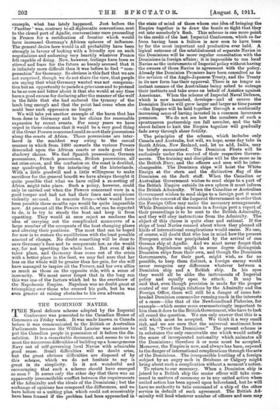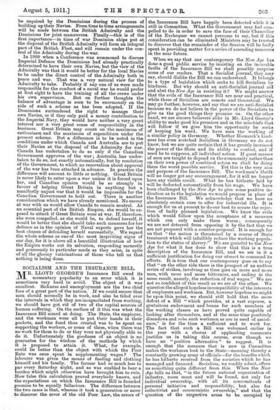THE DOMINION NAVIES.
TEIE Naval defence scheme adopted by the Imperial Conference was presented to the Canadian House of Commons on Friday week. It was made known m Canada before it was communicated to the British or Australian Parliaments because Sir Wilfrid Laurier was anxious to put the Canadian people in possession of it before the dis- solution. It is a remarkable document, and seems to us to meet the numerous difficulties of building up a homogeneous Navy out of self-governing local Navies with admirable good sense. Small difficulties will no doubt arise, but the great obvious difficulties are disposed of by this scheme, which we do not hesitate to say is great in its simplicity. Is it not wonderful and encouraging that such a scheme should have emerged so soon ? It seems only the other day that there was an apparently irreconcilable conflict between the requirements of the Admiralty and the ideals of the Dominions ; but the exchange of opinions has composed the differences, and we have before us a uniting plan which could not conceivably have been framed if the problem had been approached in the state of mind of those whose one idea of bringing the Empire together is to draw the bonds so tight that they cut into somebody's flesh. This scheme is one more point to the credit of the last Imperial Conference, which so far from having been a failure is now seen to have been by far the most important and productive ever held. A logical outcome of the establishment of separate Navies in the Dominions will be more' regular consultation with the Dominions in foreign affairs ; it is impossible to use local Navies as the instruments of Imperial policy without having the owners of those Navies in agreement with the policy. Already the Dominion Premiers have been consulted as to the revision of the Anglo-Japanese Treaty, and the Treaty in its new form has their approval. There is no longer an instant menace of the Australians being asked to outrage their instincts and take arms on behalf of Asiatics against Americans. When the scheme of Imperial Naval Defence, which is now launched, develops—and of course the Dominion Navies will grow larger and larger as time passes —the Empire will be held together through a continually increasing sense of having invested in a common insurance premium. We do not see how the members of such a spontaneous partnership can fall asunder, and the talk about failure to knit the Empire together will gradually fade away through sheer futility.
The principles of the scheme, which includes only Canada and Australia, but will, we hope, some day take in South Africa, New Zealand, and, let us add, India, may be briefly summarized. The Dominion Fleets will be exclusively under the control of their respective Govern- ments. The training and discipline will be the same as in the British Navy, and the officers and men will be inter- changeable. The Dominion ships will hoist the White Ensign at the stern and the distinctive flag of the Dominion on the Jack staff. When the Canadian or Australian Government wishes to send ships to a part of the British Empire outside its own sphere it must inform the British Admiralty. When the Canadian or Australian Government wishes to send ships to a foreign port it must obtain the consent of the Imperial Government in order that the Foreign Office may make the necessary arrangements. While Dominion ships remain in a foreign port a report of their proceedings is to be sent to the British Admiralty, and they will obey instructions from the Admiralty. The object of this clause is quite clear and rational. If the ships of local Navies roamed about where they pleased all kinds of international complications would ensue. No one, of course, will doubt that who has in mind how the present European crisis was precipitated by the arrival of one German ship at Agadir. And we must never forget that though Englishmen might in some degree distinguish Dominion ships from their own„ and though the Dominion Governments, for their part, might wish, as far as possible, to keep them distinct, a foreign enemy would never recognize any difference whatever between a Dominion ship and a British ship. In his eyes they would all be alike the instruments of Imperial policy and equally open to attack. It may be said that, even though provision is made for the proper control of our foreign relations by the Admiralty and the Foreign Office, there will still be a danger of some hot- headed Dominion commander running amok in the interests of a cause—like that of the Newfoundland Fisheries, for example—which seems more overmasteringly important to him than it does to the BritishGovernment, who have to look all round the question. We can only answer that this is a risk which must be accepted. We think it a very small risk, and we are sure that the universal sentiment here will be, " Trust the Dominions." The present scheme is in substance the only conceivable one which would satisfy the sense of incorporated nationality which animates all the Dominions ; therefore it or none must be accepted. Moreover, the Empire is now, and always has been, exposed to the danger of international complications through the acts of the Dominions. The irresponsible hustling of a foreign subject by an angry mob in Brisbane or Calgary might bring about such a complication without a moment's notice.
To return to our summary. When a Dominion ship is joined by a British ship the senior officer will take com- mand in matters of ceremony or in any united action when united action has been agreed upon beforehand, but he will have no authority to take command of a ship of the other service in default of such agreement. The British Ad- miralty will lend whatever number of officers and men may be required by the Dominions during the process of building up their Navies. From time to time arrangements will be made between the British Admiralty and the Dominions for joint manoeuvres. Finally—this is of the first importance—in time of war Dominion ships put at the disposal of the British Admiralty will form an integral part of the British Fleet, and will remain under the con- trol of the Admiralty during the war. In 1909 when a Conference was summoned to discuss Imperial Defence the Dominions had already practically determined to have their own Navies, but the view of the Admiralty was that it would be better for the local Navies to be under the direct control of the Admiralty both in peace and war. That was a very natural view for the Admiralty to take. Probably if any one of us were made responsible for the conduct of a naval war he would prefer at first sight to have the training of all the crews under his own supervision. But on further thoughts the balance of advantage is seen to be enormously on the side of such a scheme as has been adopted. If the Dominions surrendered the right to manage their own Navies, or if they only paid a money contribution to the Imperial Navy, they would have neither a very great interest nor a very great sense of responsibility in the business. Great Britain may count on the maximum of enthusiasm and the maximum of expenditure under the present scheme. But a difference is to be noted in the conditions under which Canada and Australia are to put their Navies at the disposal of the Admiralty for war. Canada has undertaken to do so only if the Canadian Government approves of the war ; Australia has under- taken to do so, not exactly automatically, but by resolution of the Government, to which no reservation about approval of the war has been attached in advance. In practice the difference will amount to little or nothing. Great Britain is never likely to enter upon a war unless it is forced upon her, and Canadian opinion would be so strongly in favour of helping Great Britain in anything but a manifestly unjust war that it would be impossible for the Canadian Government to hold out. There is another consideration which we have already mentioned. No enemy at war with us would allow Canada to remain neutral. As an essential part of the British Empire, she would be ex- posed to attack if Great Britain were at war. If, therefore, she were compelled, as she would be, to defend herself, it would be better that she should take such measures for her defence as in the opinion of Naval experts gave her the best chance of defending herself successfully. We regard the whole scheme as one of the most inspiriting signs of our day, for it is above all a beautiful illustration of how the Empire works out its salvation, responding earnestly and generously to particular needs as they arise, in spite of all the gloomy vaticinations of those who tell us that nothing is being done.







































 Previous page
Previous page